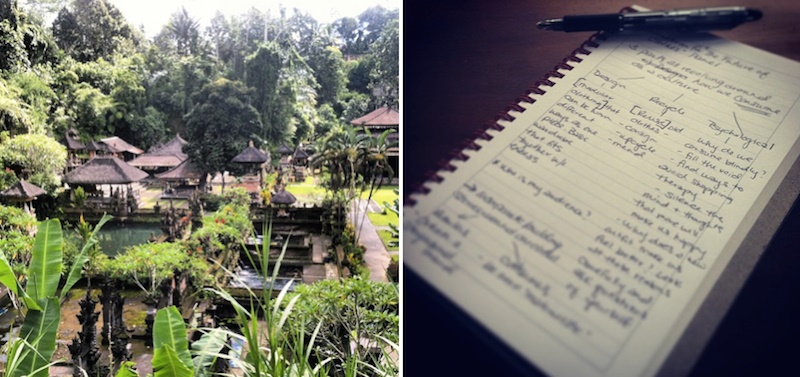A Lesson From the Book I Never Published
A few years ago, I went to Bali and wrote two versions of a book.
I know, how obnoxiously “Eat, Pray, Love” of me.
My former co-founder and I had decided to close our doors at {r}evolution apparel (after completely burning out our relationship) and it was an impulse purchase I made with my portion of our leftover funds.
I left Boulder, CO, moved in with my parents in Boston, and a month later hopped a flight halfway around the world.
After the success of our Kickstarter campaign, people were constantly saying, “You guys need to write a book.”
“Write about your journey,” they said.
“Write about the success of your Kickstarter.”
“Write about the changes needed in the fashion industry.” The suggestions were endless.
So, with the mixed emotions of heartbreak and relief that happen when you walk away from a business that seems to have such a bright future, I went to Bali to write the book that everyone said we should write.
I booked a private room for $500/month on Airbnb and found myself two miles from the nearest town surrounded by rice paddies and oxen.
For 30 days I followed the same rigid schedule. Wake up with the sun, follow the dirt road into town for yoga, eat lunch at a local cafe, walk 30 minutes home, stop for a fresh coconut, sit out on my front porch — write 2,000 words.
I reasoned that if I could average 2,000 words a day, then I would have 60,000 words by the time I left. And you only need 60,000 words for a full-length book.
The process was both grueling and therapeutic as I sifted through three years of memories.
Why we decided to start a clothing company.
How we got interested in sustainability.
An account of our first fight.
What we learned from botching our first prototype.
What it’s like to spend two months driving a conversion van around the country.
By day 15, I was ready to delete the whole file. Just burn it. Not a trace of evidence.
Instead, I opened a new document and started over.
By the time I flew back to the States, I had written two 30,000 word drafts with no intention of either seeing the light of day.
Three years later, they’re still sitting on my old, mostly-broken laptop — without a backup file.
Now I’m not going to tie this all back into the importance of creating a routine to reach goals. Or a lesson on how goals change. Or how everything happens for a reason. I’m not a personal development coach.
But I do have something to say about the “journey.”
I’m as guilty as the next person when it comes to expectations and outcomes. Most of us start businesses with the intention of making a living off of it.
Yes, passion and joy can be the driving motivators in getting started, but the desired outcome is to be able to support yourself off of that passion and joy.
The danger — the thing to look out for — is when you realize you’re only focused on the outcome.
Because that’s when you miss the journey.
About a year into starting {r}evolution apparel, I remember writing a post for our first blog – it was a letter to myself, and I’ll never forget the last sentence:
“You’re not going to be a 25-year-old bartender trying to start a clothing company forever.”
That sentence has been embedded in my brain for the past five years and as time passes, I find myself adjusting the words to fit my current age and situation.
You’re not going to be here, right now, doing this… forever.
It may seem painfully obvious, but I think it’s something that a lot of us entrepreneurs tend to forget.
Starting a business is one of the most challenging endeavours a person can take on — it’s a complete mind game, a lonely road, and can be uncomfortably risky. Are you going to enjoy every single moment of it? No.
But if you aren’t stopping every so often to appreciate what you’ve built, what you’ve created and what you’re going through — that 99% of the world never will — then what’s it all for?
When I look back at the month of my life spent writing a book, I can easily see it as time and money wasted.
Did I have big plans to pitch to publishers? Yes.
Did I have more realistic plans to self publish and sell it on Amazon? For sure.
Instead, I showed myself that I was capable of committing to a routine, to seeing a project through and being okay with a different outcome.
Entrepreneurs have to be courageous, committed and adaptable. But more than anything, they need to be able to see a vision for the future —
with an even greater appreciation for the present.






